anti-PTEN (human) Rabbit Monoclonal (RM265)
| Code | Size | Price |
|---|
| REV-31-1147-00-R100 | 100 ul | £455.00 |
Quantity:
Prices exclude any Taxes / VAT
Overview
Antibody Isotype: Rabbit IgG
Antibody Clonality: Recombinant Antibody
Antibody Clone: RM265
Regulatory Status: RUO
Target Species: Human
Applications:
- Immunohistochemistry (IHC)
- Western Blot (WB)
Shipping:
Blue Ice
Storage:
+4°C
Images
Documents
Further Information
Alternate Names/Synonyms:
Phosphatidylinositol 3,4,5-trisphosphate 3-phosphatase and Dual-specificity Protein Phosphatase; Mutated in Multiple Advanced Cancers 1; Phosphatase and Tensin Homolog
Concentration:
N/A
EClass:
32160000
Form (Short):
liquid
Formulation:
Liquid. 50% Glycerol/PBS with 1% BSA and 0.09% sodium azide.
Handling Advice:
Avoid freeze/thaw cycles.
Immunogen:
A peptide corresponding to the C-terminus of human PTEN.
Long Description:
Recombinant Antibody. This antibody reacts to human Phosphatidylinositol 3,4,5-trisphosphate 3-phosphatase and has dual-specificity to protein phosphatase PTEN. This antibody may also react to mouse PTEN, as predicted by immunogen homology. Applications: WB, IHC. Source: Rabbit. Liquid. 50% Glycerol/PBS with 1% BSA and 0.09% sodium azide. PTEN (phosphatase and tensin homologue deleted on chromosome ten) is a tumor suppressor implicated in a wide variety of human cancers. PTEN encodes a 403 amino acid polypeptide and contains a tensin like domain as well as a catalytic domain similar to that of the dual specificity protein tyrosine phosphatases. PTEN preferentially dephosphorylates phosphoinositide substrates. PTEN negatively regulates intracellular levels of phosphatidylinositol-3, 4, 5-trisphosphate in cells and functions as a tumor suppressor by negatively regulating PI3K/Akt signaling pathway. PTEN possesses a carboxy-terminal, noncatalytic regulatory domain with three phosphorylation sites (Ser380, Thr382, and Thr383) that regulate PTEN stability and may affect its biological activity. PTEN regulates p53 protein levels and activity and is involved in G protein-coupled signaling during chemotaxis. PTEN plays a role as a key modulator in neurogenesis, including correct neuron positioning, dendritic development and synapse formation and it may be also a negative regulator of insulin signaling and glucose metabolism in adipose tissue. The nuclear monoubiquitinated form possesses greater apoptotic potential, whereas the cytoplasmic nonubiquitinated form of PTEN induces less tumor suppressive ability.
NCBI, Uniprot Number:
P60484
Package Type:
Vial
Product Description:
PTEN (phosphatase and tensin homologue deleted on chromosome ten) is a tumor suppressor implicated in a wide variety of human cancers. PTEN encodes a 403 amino acid polypeptide and contains a tensin like domain as well as a catalytic domain similar to that of the dual specificity protein tyrosine phosphatases. PTEN preferentially dephosphorylates phosphoinositide substrates. PTEN negatively regulates intracellular levels of phosphatidylinositol-3, 4, 5-trisphosphate in cells and functions as a tumor suppressor by negatively regulating PI3K/Akt signaling pathway. PTEN possesses a carboxy-terminal, noncatalytic regulatory domain with three phosphorylation sites (Ser380, Thr382, and Thr383) that regulate PTEN stability and may affect its biological activity. PTEN regulates p53 protein levels and activity and is involved in G protein-coupled signaling during chemotaxis. PTEN plays a role as a key modulator in neurogenesis, including correct neuron positioning, dendritic development and synapse formation and it may be also a negative regulator of insulin signaling and glucose metabolism in adipose tissue. The nuclear monoubiquitinated form possesses greater apoptotic potential, whereas the cytoplasmic nonubiquitinated form of PTEN induces less tumor suppressive ability.
Purity:
Protein A purified.
Source / Host:
Rabbit
Specificity:
This antibody reacts to human Phosphatidylinositol 3,4,5-trisphosphate 3-phosphatase and has dual-specificity to protein phosphatase PTEN. This antibody may also react to mouse PTEN, as predicted by immunogen homology.
Transportation:
Non-hazardous
UNSPSC Category:
Primary Antibodies
UNSPSC Number:
12352203
Use & Stability:
Stable for at least 1 year after receipt when stored at -20°C.



